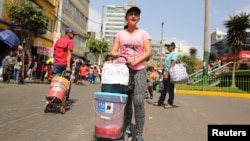Dressed in the yellow, red and blue of Venezuela's national flag, Venezuelan migrants selling food and drinks on the streets of Lima are easy to spot.
But for some of the tens of thousands of Venezuelan women who have sought refuge and jobs in Peru to escape political unrest and a humanitarian crisis back home, that attention can bring unwanted advances from lewd comments to groping, threats and worse.
Concerns about safety are echoed by women across Lima, a city of 10 million people, in a country known for high levels of violence against women.
Venezuelan migrant Massiel Bracho, who sells hot chocolate from morning to night in Lima, says she tries not to wear any revealing clothes to avoid verbal and sexual harassment.
"I'm selling stuff, but I'm not selling myself," said Bracho, a former journalist, who moved to Peru four months ago to find work.
During the first four months of this year, Peru's ministry said it received 2,415 of reports of sexual violence, a 26 percent rise from the same period in 2016.
One municipality in Lima, Pueblo Libre, earlier this year introduced a fine of $1,240 in an effort to curb sexual and verbal harassment on the streets, including cat-calling and whistling.
Venezuelans are leaving a homeland in the throes of a crippling economic crisis.
Residents are struggling to find food, fuel and medicine.
Unemployment and crime have soared, and political turmoil has led to violent and deadly protests in the streets.
Cecile Blouin, senior researcher at the Institute of Democracy and Human Rights at the Pontifical Catholic University of Peru, estimates about 40,000 Venezuelan women and men settled in Peru this year.
Venezuelans are also increasingly applying for refugee status in Peru, with 4,392 requests in 2016 compared with 339 in 2015, Blouin said.
Garrinzon Gonzalez, head of Lima-based Venezuela Union in Peru, a support group for Venezuelan migrants that offers legal advice, said it has seen cases of sexual assault and several women have filed police reports.
"Here in Peru, there's a lot of machismo," Gonzalez, a Venezuelan who moved to Lima five years ago, told the Thomson Reuters Foundation.
"We have heard cases where a man approaches a girl, asks her what she's selling and then offers to buy them all if she will go with him," he said.
Gonzalez said the full extent of the problem is unknown because victims are often reluctant to report sexual harassment for fear of being deported.
"Lots of women are scared to tell the police because in some cases they don't have the right visa and they prefer to keep quiet," he said.
Often overstaying tourist visas while they apply for temporary work permits or refugee status, women from Venezuela scrape by finding informal work in shops, restaurants and beauty parlors.
They are at risk of labour exploitation, including receiving little or no pay, having their wages withheld and not getting overtime pay, experts say.
"In general labor conditions for Venezuelans are precarious," Blouin said.
Venezuelan Maria Briceno, an 18-year-old drama student who arrived in Peru in August, said she was interviewed for a job at a beauty parlor.
Then the manager sent her a stream of crude messages and an invitation to go on a date, she said.
"It made me feel harassed. I felt a bit scared," Briceno said. "It's not to say that there aren't perverted people in Venezuela, but it's easier to deal with because they are your own people. Here you don't know what to do or what will happen if you turn them down."
Reporting by Jack Guy Editing by Anastasia Moloney and Ellen Wulfhorst.





